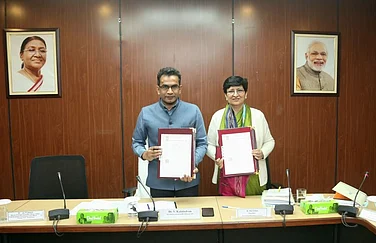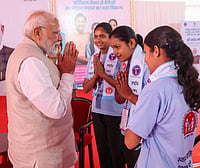About 75% of human diseases, such as COVID-19, Avian Influenza, Scrub Typhus, Nipah, and leptospirosis, originate in animals—calling for a One Health approach. Yet, health challenges are still being addressed in silos, experts lamented here.
Prof. Umesh Kapil, President of the Epidemiology Foundation of India, explained that recent outbreaks of zoonotic diseases like coronavirus and zoonotic TB have highlighted the close links between human activity, wildlife, and the environment.
“Rapid urbanization, deforestation, and climate change have amplified these risks, underscoring the need for coordinated public health action. Hence, there is a need to look at health in its totality—this is not happening. However, right now, what is happening is that it is being addressed in silos,” he said, stressing that the One Health approach is not a theoretical concept but a public health necessity for India.
He added, “All ministries, including health, agriculture, and environment, must examine their respective roles in addressing health determinants and disease patterns, but that coordination has been lacking so far.”
To bridge this gap, a high-level inter-ministerial meeting headed by Prime Minister Narendra Modi is being convened on November 20 and 21 in the national capital, bringing together eleven concerned ministries to align policies and actions on health threats.
Talking to reporters on the sidelines of the national workshop on “Strengthening Surveillance, Diagnostics, and One Health Response,” being held at AIIMS Delhi, Prof. Kapil cited the growing threat of antimicrobial resistance (AMR), driven by the overuse of antibiotics.
“Urgent coordinated action is needed. Agriculture and health ministries must work together to curb misuse in the veterinary sector,” Dr. C. M. Singh, Community Medicine, RML Lucknow, chipped in, warning that AMR threatens to make common infections untreatable by 2050.
Dr. Pradeep Aggrawal, Additional Professor, Community Medicine at AIIMS Rishikesh, stressed integrating wildlife, forestry, and pollution control efforts, as environmental degradation and deforestation are increasing zoonotic spillovers. At the same time, Dr. Ashok Bhardwaj from MM Medical College, Solan (HP), talked about the One Health approach in TB control measures.
At the workshop, Prof. M. Srinivas, Director of AIIMS Delhi, emphasized embedding One Health into India’s institutional culture—from research to public health response. Dr. Nivedita Gupta (ICMR) outlined the National One Health Mission to unify surveillance of human, animal, and environmental health, while Dr. Manoj Murhekar (NIE Chennai) shared lessons from leptospirosis outbreaks.
Regional One Health centers, noted Dr. Pragya Yadav (Nagpur), will serve as hubs for research, training, and outbreak preparedness. Experts also called for integrated digital surveillance, cross-sectoral training, community engagement, and stronger investment in vaccines and research to address emerging threats effectively.
“Adopting a One Health perspective is no longer optional—it is essential to safeguard India’s public health,” Dr. George M. Varghese (CMC Vellore) said.
Other experts, including Dr. Pawan Kumar from the Union Health Ministry and Dr. Anoop Velayudhan (ICMR), discussed integrating vaccination, surveillance, and policy frameworks that bridge the human-animal-environment divide, while Dr. Krishnamurthy Kannan (CSIR-NEERI) highlighted links between environmental pollution and public health, calling for policies that treat ecological conservation as a health imperative.
Participants from AIIMS Bathinda, AIIMS Rishikesh, Gujarat Medical College Rajkot, and NHSRC shared regional innovations and best practices in implementing One Health strategies on the ground.
Experts at the workshop also stressed the need for integrated digital surveillance systems linking data from human, animal, and environmental sources, along with cross-sectoral training programs for health professionals, veterinarians, and environmental scientists.
They also highlighted the importance of community engagement, timely reporting, and increased investment in research, vaccine development, and monitoring antimicrobial resistance to strengthen India’s preparedness against emerging health threats.






















